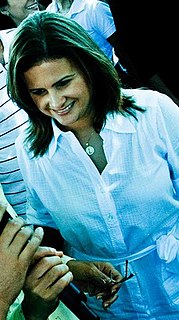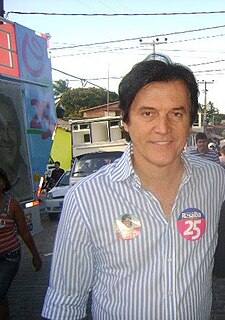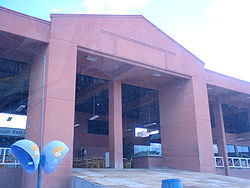
Rio Grande do Norte is one of the states of Brazil. It is located in the northeastern region of the country, forming the northeasternmost tip of the South American continent. The name literally translates as "Great Northern River", referring to the mouth of the Potengi River.

Natal is the capital and largest city of the state Rio Grande do Norte, located in northeastern Brazil. According to IBGE's 2021 estimate, the city had a total population of 896,708, making it the 19th largest city in the country. Natal is a major tourist destination and an exporting hub of crustaceans, carnauba wax and fruits, mostly melon, sugar apple, cashew and papaya. It is the country's closest city to Africa and Europe, with its Greater Natal International Airport connecting Natal with many Brazilian cities and also operating some international flights. The city was one of the host cities of the 2014 FIFA World Cup.
Talian is a dialect of the Venetian language, spoken primarily in the Serra Gaúcha region in the northeast of the state of Rio Grande do Sul in Brazil. It is also spoken in other parts of Rio Grande do Sul, as well as in parts of Espirito Santo and of Santa Catarina.

Garibaldi Alves Filho is a Brazilian politician and former President of the Federal Senate.

Icó[iˈkɔ] is a town of in Ceará, Brazil. It is located in the Microrregião of Salgado in the central part of the state. Icó borders the municipalities of Umari, Cedro, Iguatu, Orós, Jaguaribe, Pereiro, and the states of Rio Grande do Norte and Paraíba. The seat of the town, also called Icó, is located 375 kilometres (233 mi) from the state capital, Fortaleza. The municipality covers 1,872 km2 (723 sq mi) and has a population of 68,162 with a population density of 36 inhabitants per square kilometer. It is located 1,872 km (1,163 mi) from the state capital of Sergipe, Aracaju.

Micarla Araújo de Sousa Weber is a Brazilian journalist, politician and former mayor of Natal. She is Natal's second female mayor.

Rosalba Scotia Ciarlini Rosado is a medical doctor and Brazilian politician. Affiliated with the PP, she was the governor of the state of Rio Grande do Norte.
The Brazilian municipal elections of 2012 took place on October 7 and on October 28. Over 138 million voters chose mayors, deputy mayors and city councillors for the 5,568 municipalities of Brazil. These were the first elections in which the recently registered parties Partido Pátria Livre (PPL) and Partido Social Democrático (PSD) participated; they were both recognized by the Superior Electoral Court in 2011. Political parties whose candidates wished to run for the 2012 elections had to be registered at the TSE for at least one year before the election date, while candidates also had to be affiliated to a party for the same period of time. Conventions for the selection of candidates within the parties occurred between 10 and 30 June, while the registry of candidates and alliances with the Regional Electoral Courts took place until July 5. Electoral campaign was authorized from the moment a candidacy had been registered. The free electoral program – two daily slots on free-to-air TV and radio for political advertising paid by the Electoral Justice fund – ran weekdays from 21 August until 4 October. According to the current Brazilian electoral law, the two-round system – should the leading candidate receive less than 50% +1 of the votes – is only available for cities with more than 200,000 voters. This includes all state capitals, with the exception of Boa Vista, Roraima and Palmas, Tocantins, plus 59 other municipalities. The free electoral program for the second round ran from 13 October until 26 October.

Events in the year 1902 in Brazil.

Events in the year 1912 in Brazil.

Events in the year 1913 in Brazil.

Events in the year 1916 in Brazil.

Events in the year 1920 in Brazil.

Events in the year 1925 in Brazil.

Events in the year 2014 in Brazil.

Events in the year 1939 in Brazil.

Events in the year 1948 in Brazil.

Events in the year 1955 in Brazil.

Robinson Mesquita de Faria is a Brazilian politician. He is the governor of Rio Grande do Norte state in Brazil (2015–2018).












